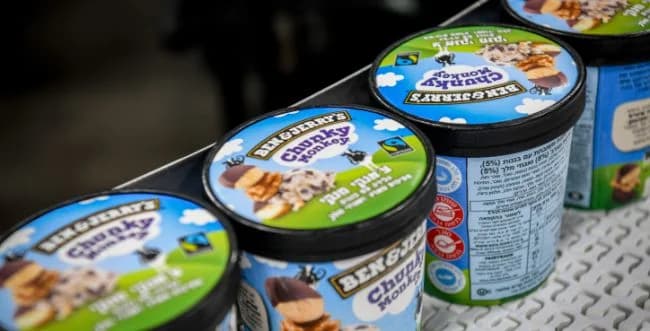Is ice cream Pro-Palestine? You bet.
Due to the war in Gaza: Ben & Jerry's in a massive lawsuit
The American ice cream company "Ben & Jerry's" has filed a lawsuit against its parent company Unilever, claiming that the organization prohibited it from publishing messages expressing support for Palestinians and calling for an end to the war in Gaza.

Legal dispute: The American ice cream company "Ben & Jerry's" filed a lawsuit today (Thursday) against its parent company, "Unilever," claiming that the organization prevented the company from publishing messages expressing support for the Palestinians and "silenced" their attempts to speak out on the war in Gaza and call for a ceasefire.
In the lawsuit filed in the New York court, it is claimed that "Ben & Jerry's attempted four different times to publicly express support for peace and human rights – but Unilever silenced us each time." According to them, the ice cream company executives intended to issue a call for a ceasefire in Gaza, support the safe passage of Palestinian refugees to the UK, express support for pro-Palestinian protesters on US campuses, and call for an end to American arms shipments to Israel – but Unilever stopped them from spreading these messages.
It was also claimed that Unilever prohibited Ben & Jerry's from donating money to the pro-Palestinian organization "Jewish Voice for Peace," out of concern for the "perception of ongoing antisemitism" from the ice cream company. The company claimed that this constitutes a breach of the settlement agreement signed between them following the previous lawsuit in 2022, in which Unilever committed to respecting the independence of the Ben & Jerry's board on social issues. Unilever has not yet responded to the reports about the lawsuit and the accusations against them.
This is not the first time Ben & Jerry's has been involved in a lawsuit due to its stance towards Israel. As a reminder, in 2022 the company filed a lawsuit against Unilever to block the sale of the brand to the Israeli manufacturer, Avi Singer – thereby allowing the continued sale of the company's products in Judea and Samaria. According to the lawsuit, the sale threatened the character of the Ben & Jerry's brand, and the company's board has the right to protect the brand under the 2000 acquisition agreement with Unilever.
In the end, the court rejected the request for an injunction and allowed the sale of the brand – since it did not show that it would suffer irreparable damage, or that customers would be confused by the move.